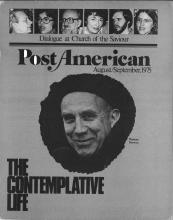Prayer is the acid test of personal faith. When there is no prayer there is no faith relationship. To pray is to move beyond concepts and propositions into a living relationship with Jesus Christ. But that is difficult because we are enamored with our theological distinctions and the finely tuned formulations of our dogma. Indeed, we are comfortable with a God we have been able to define and describe. He somehow seems under our control and we lull ourselves with the thought that he cannot get out of hand.
Prayer is dialogue. It is the dialogue of faith with a living Being who hears and who is responsive to our cries and petitions. To pray is to believe that there is a God who hears and who cares. Vital prayer is quite different from the normal experience of so many in the church. We seem to be caught in one of two extremes: either making our prayer life a theological process in the head or a folksy chat over the backyard fence. But this is no dialogue with God. It is merely a projection of my own ego onto some imagined cosmic movie screen.
To say that prayer is dialogue is to take both parties in the dialogue with utmost seriousness. It is to know the God of scripture, the God of Abraham, Isaac, Jacob, Ruth, Isaiah. Jeremiah, Mary, John, Paul, and Jesus Christ in the very vortex of one's own being. It is to know that the God of all the Universe is also the God who loves me and has come to dwell with me in Jesus Christ. "Jesus answered him, 'Whoever loves me will obey my message. My Father will love him, and my Father and I will come to him and live with him'" (John 14:23).
Read the Full Article

